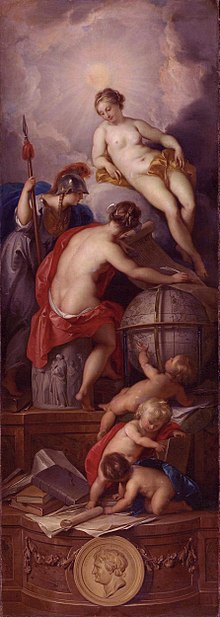
Back علم التاريخ Arabic التأريخ ARZ Historiografía AST Tarixşünaslıq AZ Тарихнамә BA Гістарыяграфія BE Гістарыяграфія BE-X-OLD Историография Bulgarian Historiografi BJN ইতিহাস-সঙ্কলনবিদ্যা Bengali/Bangla

Historiography is the study of the methods used by historians in developing history as an academic discipline, and by extension, the term historiography is any body of historical work on a particular subject. The historiography of a specific topic covers how historians have studied that topic by using particular sources, techniques of research, and theoretical approaches to the interpretation of documentary sources. Scholars discuss historiography by topic—such as the historiography of the United Kingdom, of WWII, of the pre-Columbian Americas, of early Islam, and of China—and different approaches to the work and the genres of history, such as political history and social history. Beginning in the nineteenth century, the development of academic history produced a great corpus of historiographic literature. The extent to which historians are influenced by their own groups and loyalties—such as to their nation state—remains a debated question.[1][2]
In Europe, the academic discipline of historiography was established in the 5th century BC with the Histories, by Herodotus, who thus established Greek historiography. In the 2nd century BC, the Roman statesman Cato the Elder produced the Origines, which is the first Roman historiography. In Asia, the father and son intellectuals Sima Tan and Sima Qian established Chinese historiography with the book Shiji (Records of the Grand Historian), in the time of the Han Empire in Ancient China. During the Middle Ages, medieval historiography included the works of chronicles in medieval Europe, the Ethiopian Empire in the Horn of Africa, Islamic histories by Muslim historians, and the Korean and Japanese historical writings based on the existing Chinese model. During the 18th-century Age of Enlightenment, historiography in the Western world was shaped and developed by figures such as Voltaire, David Hume, and Edward Gibbon, who among others set the foundations for the modern discipline. In the 19th century, historical studies became professionalized at universities and research centers along with a belief that history was like a science.[3] In the 20th century, historians incorporated social science dimensions like politics, economy, and culture in their historiography.[3]
The research interests of historians change over time, and there has been a shift away from traditional diplomatic, economic, and political history toward newer approaches, especially social and cultural studies. From 1975 to 1995 the proportion of professors of history in American universities identifying with social history increased from 31 to 41 percent, while the proportion of political historians decreased from 40 to 30 percent.[4] In 2007, of 5,723 faculty members in the departments of history at British universities, 1,644 (29 percent) identified themselves with social history and 1,425 (25 percent) identified themselves with political history.[5] Since the 1980s there has been a special interest in the memories and commemoration of past events—the histories as remembered and presented for popular celebration.[6]
- ^ Ferro, Marc (2003). The Use and Abuse of History: Or How the Past Is Taught to Children. Routledge. ISBN 978-0415285926.
- ^ Candelaria, John Lee; Alporha, Veronica (2018). Readings in Philippine History. Rex Book Store, Incorporated. ISBN 978-9712386657.
- ^ a b Georg G. Iggers, Historiography in the Twentieth Century: From Scientific Objectivity to the Postmodern Challenge, 1-4. ISBN 978-0819567666
- ^ Diplomatic dropped from 5 to 3 percent, economic history dropped from 7 to 5 percent, and cultural history grew from 14 to 16 percent. Based on the number of full-time professors in U.S. history departments. Stephen H. Haber, David M. Kennedy, and Stephen D. Krasner, "Brothers under the Skin: Diplomatic History and International Relations", International Security, Vol. 22, No. 1 (Summer, 1997), pp. 34–43 at p. 42 online at JSTOR Archived 2019-05-31 at the Wayback Machine
- ^ See "Teachers of History in the Universities of the UK 2007 – listed by research interest" Archived 2006-05-30 at the Wayback Machine
- ^ David Glassberg, "Public history and the study of memory." The Public Historian 18.2 (1996): 7–23 online Archived 2020-02-13 at the Wayback Machine.